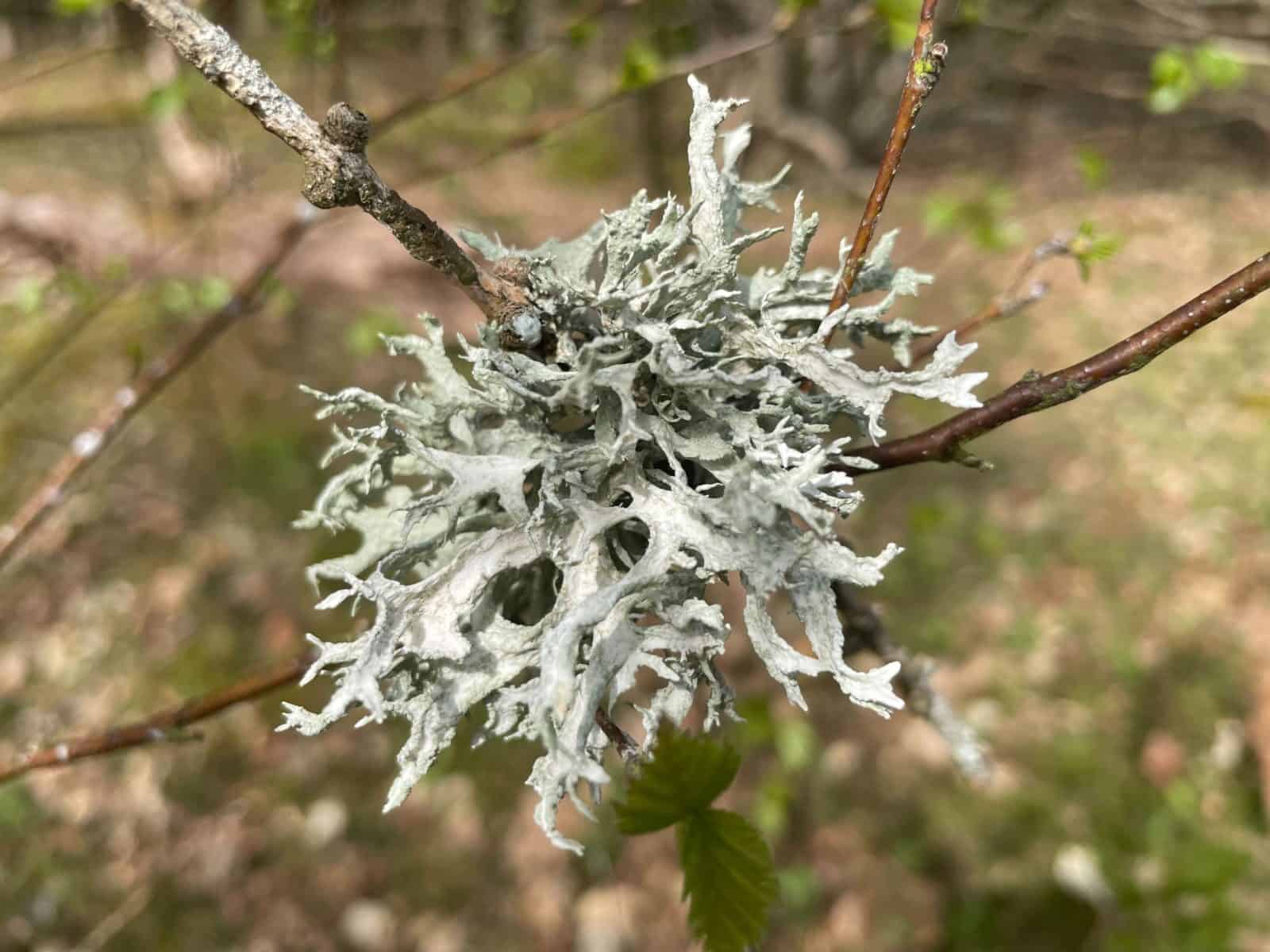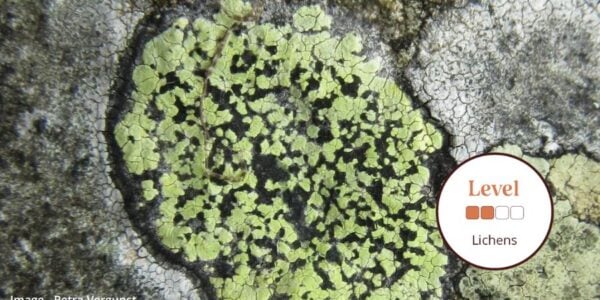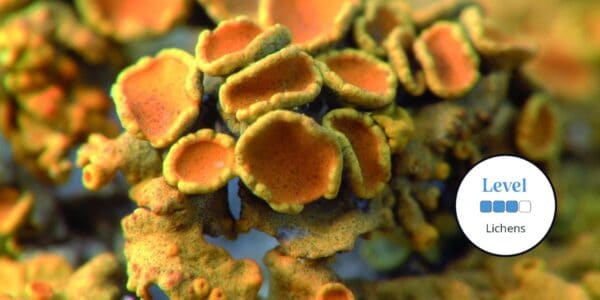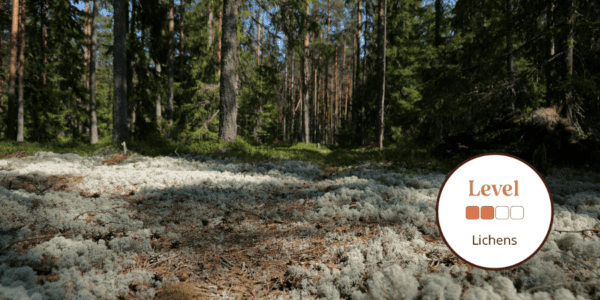This beginner-early intermediate lichens course will consist of a blend of field and classroom sessions to provide you with a general introduction to lichens as a group, focusing on morphology, biology, ecology and chemistry, alongside identification and recording.
Lichens are an important part of many ecosystems and can be found all around us. These are amazing small plant-like structures found on a range of surfaces ranging from rocks and boulders to buildings and the sides of trees.
Read More
The workshop will include a series of field visits to local sites around the Field Studies Council Nettlecombe Centre, situated in one of the corners of Exmoor National Park. With the rich lichen diversity across Somerset, the Centre is perfectly situated for an introductory course to lichens, especially with the spectacular variety that can be found in the south west of England. The knowledge and skillset acquired over the duration of this course will equip you with the confidence to delve further into lichens as a group, where follow-up support is offered by the course tutor. This course will have a strong focus on lichens within the historic landscape of Nettlecombe, where students will encounter a suite of ancient woodland species and understand the management required for their conservation.
What will be covered during this course?
The course will be delivered through a combination of presentations, laboratory identification sessions and practical field work. Field work will involve visiting a range of habitats where the specimens can be identified within an ecological context.
- Introduction to lichens – biology, chemistry & ecology.
- Identifying common lichens around the centre and local field trips.
- How to identify lichens:
- Demonstrations of equipment – handlens, microscope & ID guides.
- Thallus types/structure – crustose, foliose, fruticose, leprose & squamulose.
- Key features – apothecia, perithecia, soredia, isidia, rhizines & cilia.
- Lichen literature & the use of identification keys.
- Chemical testing and safe application as a form of identification.
- Woodland and parkland habitat management for lichens.
- How to record lichens:
- Concept of herbaria and reference collections.
- Introduction to biological recording and submitting records to the British Lichen Society (BLS).
By the end of the course, you will be able to:
- Develop a greater understanding of lichens (biology, chemistry & ecology).
- Confidently use equipment and resources provided.
- Identify the main thallus types/structure in the classroom & in the field.
- Recognise the main features used for ID in the classroom & in the field.
- Identify some of the commoner lichens & their associated features.
- Gain insight into lichen literature & the use of dichotomous keys.
- Successfully apply chemical testing for identification purposes.
- Understand the importance & process of biological recording/collecting specimens.
Who Should Attend? – Natural history enthusiasts, students, rangers, ecologists, environmental professionals.
Knowledge Level – Beginner – early intermediate. Level descriptors can be found on the following web-page: Framework and Course Level Descriptors
Prior Knowledge – No prior knowledge is required before attending this course and will cover the basics in lichen identification and recording.
Please note that accommodation and meals are not included in the course fee. Refreshments (tea and coffee) will be provided. Please email [email protected] if you have any questions.
About the Tutor
April Windle
April Windle is a naturalist with a particular interest in lichens. She is currently self-employed and involved in a variety of lichen education and conservation projects, alongside co-chairing the Education & Promotions Committee of the British Lichen Society. Her previous employment history includes Plantlife International, the Natural History Museum, Exmoor National Park Authority and the Royal Society for the Protection of Birds. LinkedIn: April Windle / Twitter: @aprilwindle
Example Timetable
Courses run from 9 am – 5pm, with an hour for lunch.
The classroom will also be open in the evening from 7pm onwards for those who wish to continue their studies (where tutor support will be on hand).
Please note that accommodation and meals are not included in the course fee.
Refreshments (tea and coffee) will be provided.
What's Included
The course has been carefully created by expert tutors and educators to help you continue to build and develop your knowledge and apply it within the field surrounded by like-minded individuals.
The course includes:
- Classroom learning covering the theory of the species
- Field excursions to apply new knowledge
- Expert tuition for which the Field Studies Council is renowned
- Clear objectives and progression
- Refreshments (tea and coffee)
Reviews
-
★★★★★
April really is a people person and was able to establish a relaxed atmosphere during the first session
-
★★★★★
It was all fascinating, the course tutor was very good, the other course participants were very interesting
-
★★★★☆
The balance of field and classroom work was good and I felt I came away with sufficient tools and understanding to continue to expand my knowledge of the group. The tutor introduced the topics in a logical and steady way and followed these up with field experiences to reinforce klnowledge and understanding. A well thought through course.
-
★★★★☆
The opportunity to come and immerse myself in a subject, with the mixture of classroom sessions and field work and the evenings in the lab, is priceless.
Bursaries and Subsidies
Student Discount
This course is eligible for a student discount. If you are a current student, please use discount code BioStudent20 at checkout for 20% off all Biodiversity courses.
Before You Attend
What to Bring?
- Sturdy walking boots (ideally) or wellies.
- Good set of waterproofs (jacket & trousers) and an umbrella.
- Warm clothing (i.e. fleece, hat & gloves).
- Sun cream & clothing for cooler weather.
- Pens, notebooks and waterproof covers/plastic bags for the field.
- Phones and cameras will also prove useful for pictures.
- A day rucksack inc. lunch box, water bottle & thermos flask.
- A x10 magnification hand lens. Those costing between £3.00 - £5.00 are sufficient.
- Please bring your own refreshments & pack lunch.
Recommended Equipment & Literature
When you book this course, you will receive a discount code for the Field Studies Council recommended guides below.
- Field Studies Council fold-out guide – Lichens on Twigs, Lichens of heaths & moors, Churchyard Lichens, Rocky Shore Lichens and Urban Lichens 1 & 2.
- Frank Dobson – A Field Key to Lichens on Trees, Coastal & Seashore and Churchyards.
- Frank Dobson - Lichens: An Illustrated Guide to the British and Irish Species.
Opportunities to attend this course
-
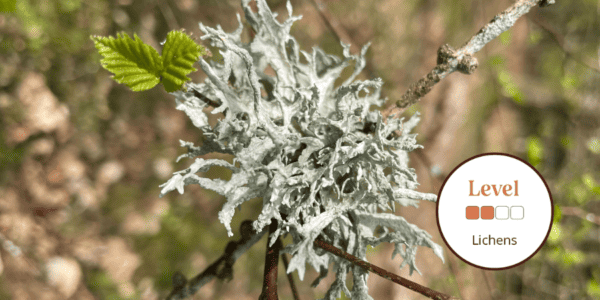
Sat 25, May 2024 09:00 - Sun 26, May 2024 17:00
If you would like to book accommodation, lunch and an evening meal at Nettlecombe please email [email protected]. Please note the Centre may not be able to guarantee accommodation and meals during this course.
Sorry this course is out of stock
No current dates for this course? Click here to view all the upcoming Natural History courses.
Progress Your Learning
This is a training course from the Field Studies Council, delivered by expert tutors with an approachable learning style. After attending this course, you may like to progress your learning with further relevant courses or branch out into other areas of natural history. The Field Studies Council offers both online and in-person courses, so you can choose the learning style that suits you best.
The course gives you the opportunity to immerse yourself in a new subject and acquire novel skills. Our online portal gives you time to study at your own pace and fit the lessons around your own schedule.
If you have any questions about our courses please check our Frequently Asked Questions or email [email protected].
Group Bookings Made Easy
If you have a group of 10 or more individuals wanting to complete one of our courses, our team are available to discuss your options – from discounts to private team courses. Click here to find out more!
You can rest assured that the absolute best content from an expert in environmental education will be at your fingertips. In choosing a Field Studies Council course, you will be joining thousands of people who learn with us each year.

